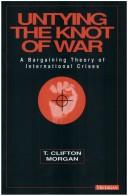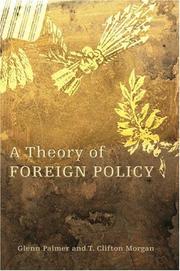| Listing 1 - 5 of 5 |
Sort by
|

ISBN: 047210277X Year: 1994 Publisher: Ann Arbor University of Michigan Press
Abstract | Keywords | Export | Availability | Bookmark
 Loading...
Loading...Choose an application
- Reference Manager
- EndNote
- RefWorks (Direct export to RefWorks)
810 Theorie en Methode --- 820 Internationale Betrekkingen --- 830 Economie --- 841 Politiek Bestel --- 844 Sociale Structuur --- 850 Vrede- en conflictstudies --- 855 Oorlogsvoering --- 856.1 Conflictpreventie --- Crisis management --- International relations --- Negotiation --- Crises --- Management of crises --- Mathematical models --- Management --- Problem solving --- Conflict management

ISBN: 1283310392 9786613310392 1400832640 9781400832644 9780691146553 0691146551 0691123594 9780691123592 0691123594 9780691123592 9781283310390 6613310395 Year: 2006 Publisher: Princeton: Princeton university press,
Abstract | Keywords | Export | Availability | Bookmark
 Loading...
Loading...Choose an application
- Reference Manager
- EndNote
- RefWorks (Direct export to RefWorks)
This book presents a general explanation of how states develop their foreign policy. The theory stands in contrast to most approaches--which assume that states want to maximize security--by assuming that states pursue two things, or goods, through their foreign policy: change and maintenance. States, in other words, try both to change aspects of the international status quo that they don't like and maintain those aspects they do like. A state's ability to do so is largely a function of its relative capability, and since national capability is finite, a state must make trade-offs between policies designed to achieve change or maintenance. Glenn Palmer and Clifton Morgan apply their theory to cases ranging from American foreign policy since World War II to Chinese foreign policy since 1949 to the Suez Canal Crisis. The many implications bear upon specific policies such as conflict initiation, foreign aid allocation, military spending, and alliance formation. Particularly useful are the implications for foreign policy substitutability. The authors also undertake statistical analyses of a wide range of behaviors, and these generally support the theory. A Theory of Foreign Policy represents a major advance over traditional analyses of international relations. Not only do its empirical implications speak to a broader range of policies but, more importantly, the book illuminates the trade-offs decision makers face in selecting among policies to maximize utility, given a state's goals.
International relations. --- Coexistence --- Foreign affairs --- Foreign policy --- Foreign relations --- Global governance --- Interdependence of nations --- International affairs --- Peaceful coexistence --- World order --- National security --- Sovereignty --- World politics --- World politics. --- Colonialism --- Global politics --- International politics --- Political history --- Political science --- World history --- Eastern question --- Geopolitics --- International organization --- International relations
Digital
ISBN: 9781400832644 9780691146553 Year: 2011 Publisher: Princeton, N.J. Princeton University Press
Abstract | Keywords | Export | Availability | Bookmark
 Loading...
Loading...Choose an application
- Reference Manager
- EndNote
- RefWorks (Direct export to RefWorks)
Book

ISBN: 9781685852580 1685852580 Year: 2023 Publisher: Boulder
Abstract | Keywords | Export | Availability | Bookmark
 Loading...
Loading...Choose an application
- Reference Manager
- EndNote
- RefWorks (Direct export to RefWorks)
Explores power relationships in world politics, focusing on what power is and what it is not, on the ways in which power has been assessed, and on the major lessons for international politics that can be gleaned through an analysis of power.
Multi

ISBN: 9781685852580 9781555871253 Year: 2023 Publisher: Boulder Lynne Rienner Publishers
Abstract | Keywords | Export | Availability | Bookmark
 Loading...
Loading...Choose an application
- Reference Manager
- EndNote
- RefWorks (Direct export to RefWorks)
| Listing 1 - 5 of 5 |
Sort by
|

 Search
Search Feedback
Feedback About UniCat
About UniCat  Help
Help News
News